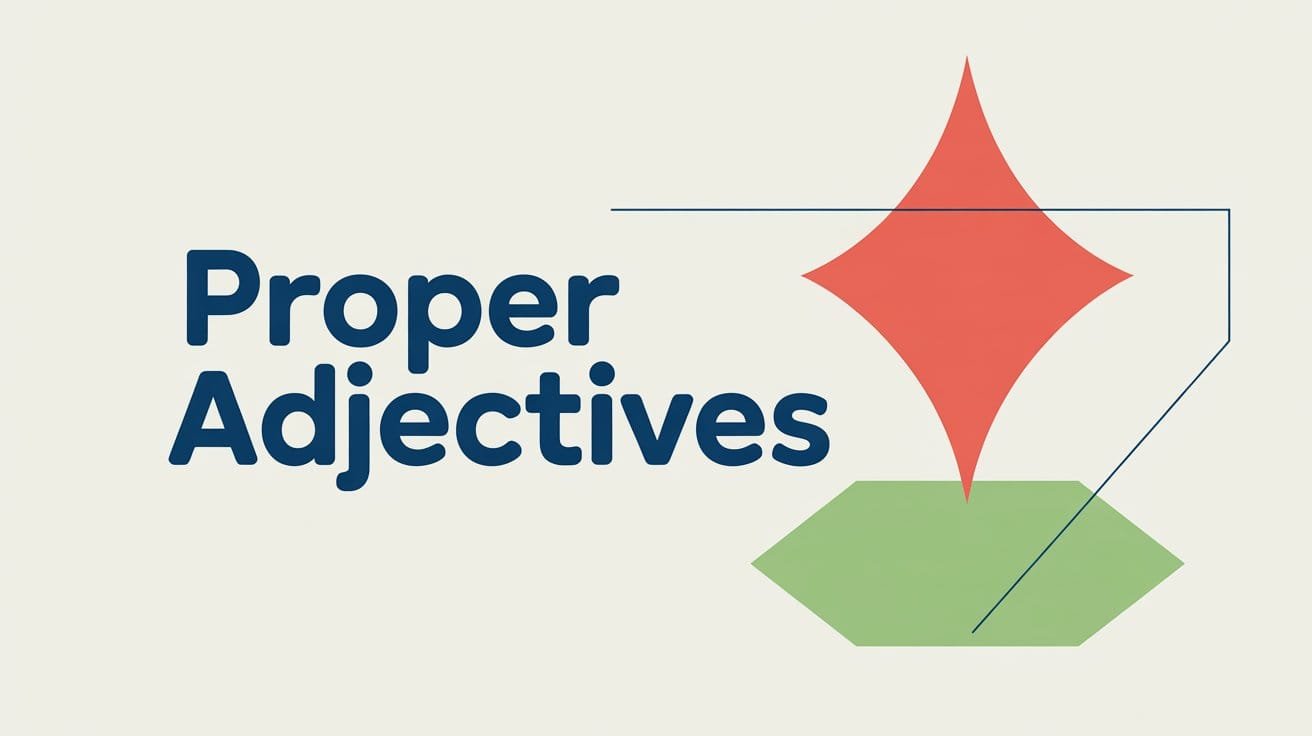Some adjectives do more than describe—they point to a specific place, culture, or identity. These are called proper adjectives.
Unlike regular adjectives, proper adjectives are formed from proper nouns like India, Christianity, or Shakespeare. When you say Indian cuisine, Christian values, or Shakespearean drama, you’re using proper adjectives to give more detail with a clear connection to a name, origin, or identity.
What Is a Proper Adjective?
A proper adjective is an adjective that is formed from a proper noun and typically describes something related to a specific place, person, language, culture, or brand. Like proper nouns, they are always capitalized.
They usually appear before a noun and help specify origin or identity in a sentence.
Examples:
- She’s studying French literature. (French comes from the proper noun France.)
- We watched a Japanese film last night. (Japanese comes from Japan.)
- He collects Victorian furniture. (Victorian comes from Queen Victoria.)
Proper adjectives help add precision to your writing by pointing to something well-defined or culturally known.
How to Form Proper Adjectives
Proper adjectives are usually formed by modifying a proper noun—often by adding a suffix or changing the word slightly to fit adjective form. The most common sources are names of countries, regions, languages, religions, and historical figures.
From Country or Place Names
Most country names form adjectives by adding -an, -ian, -ese, or -ish.
| Proper Noun | Proper Adjective |
|---|---|
| Brazil | Brazilian |
| Spain | Spanish |
| China | Chinese |
| Canada | Canadian |
From Languages or Nationalities
Language names often function as proper adjectives without change.
- German novels are popular worldwide.
- She speaks Arabic fluently.
From Religions or Philosophies
These often end in -an, -ic, or remain unchanged.
- They follow Buddhist teachings.
- The book covers Islamic history.
- He grew up in a Christian household.
From Historical or Literary Figures
Many proper adjectives come from famous names, especially in history or literature.
- The play has a Shakespearean style.
- The house is filled with Victorian decor.
These transformations aren’t random—most follow repeatable patterns that make them easy to identify and use correctly.
Common Rules for Using Proper Adjectives
Proper adjectives follow a few consistent rules that make them easy to spot and use correctly in a sentence. Here’s what to remember:
1. Always Capitalized
Just like proper nouns, proper adjectives always begin with a capital letter, no matter where they appear in the sentence.
- She enjoys Italian cuisine.
- He studied Buddhist philosophy.
2. Used Before a Noun
Proper adjectives function just like other adjectives—they come before the noun they describe.
- We visited a Greek temple.
- They watched a French documentary.
3. Don’t Confuse Them with Proper Nouns
A proper noun names a specific person, place, or thing. A proper adjective describes something related to that noun.
- Proper noun: Italy
- Proper adjective: Italian (as in Italian art)
Proper Adjectives vs. Common Adjectives
Both proper and common adjectives describe nouns, but they differ in specificity, capitalization, and origin.
Capitalization
- Proper adjectives are always capitalized:
✔ She wore a Spanish dress. - Common adjectives are not:
✔ She wore a red dress.
Source of the Adjective
- A proper adjective is formed from a proper noun (e.g., Canada → Canadian).
- A common adjective is a general descriptor (big, small, old, fast).
Level of Specificity
- Proper adjectives point to something specific:
✔ He studies Japanese history. - Common adjectives are broad:
✔ He studies ancient history.
Paired Examples:
| Proper Adjective | Common Adjective |
|---|---|
| French cuisine | delicious cuisine |
| Victorian furniture | old furniture |
| Italian shoes | fancy shoes |
List of Proper Adjectives from Common Proper Nouns
This table shows how proper adjectives are formed from proper nouns and used in sentences.
| Proper Noun | Proper Adjective |
|---|---|
| Italy | Italian |
| Shakespeare | Shakespearean |
| Islam | Islamic |
| America | American |
| Canada | Canadian |
| Japan | Japanese |
| Christianity | Christian |
| China | Chinese |
| Greece | Greek |
| Mexico | Mexican |
Examples of Proper Adjectives in Sentences
Each sentence below uses a proper adjective before a noun to show origin, association, or identity.
- The museum displayed Egyptian artifacts from ancient times.
- I enjoy reading Russian novels during winter.
- He wore a Mexican poncho made of wool.
- They served Italian pasta with homemade sauce.
- We saw a Chinese lantern festival downtown.
- She listens to Korean pop music.
- He bought a Persian rug for the living room.
- The documentary explores African tribal cultures.
- They joined a Buddhist meditation retreat.
- The Japanese garden was beautifully maintained.
- He’s writing a paper on Victorian literature.
- She prefers French cheese with her wine.
- They enrolled in a German language course.
- The actor performed in a Shakespearean drama.
- I’m fascinated by Greek mythology.
- We took a class on Hindu philosophy.
- The team competed in an Olympic qualifier.
- She wore a Scottish tartan dress.
- The group visited a Roman amphitheater.
- He gave a speech on American politics.
FAQs About Proper Adjectives
What is a proper adjective?
A proper adjective is formed from a proper noun and describes something specific, like origin, culture, or identity. It always begins with a capital letter (e.g., French cuisine, Buddhist monk).
Are proper adjectives always capitalized?
Yes. Proper adjectives must always be capitalized, just like the proper nouns they come from.
What’s the difference between a proper adjective and a proper noun?
A proper noun names something specific (like Spain), while a proper adjective describes something related to it (Spanish culture).
Can a word be both a proper noun and a proper adjective?
No. A word functions as one or the other depending on use. France is a proper noun; French is a proper adjective.
Is “English” a proper adjective?
Yes. English is a proper adjective because it comes from a proper noun and describes something specific, such as language, nationality, or culture. For example, in English novel or English grammar, the word English tells us the origin and is always capitalized.



